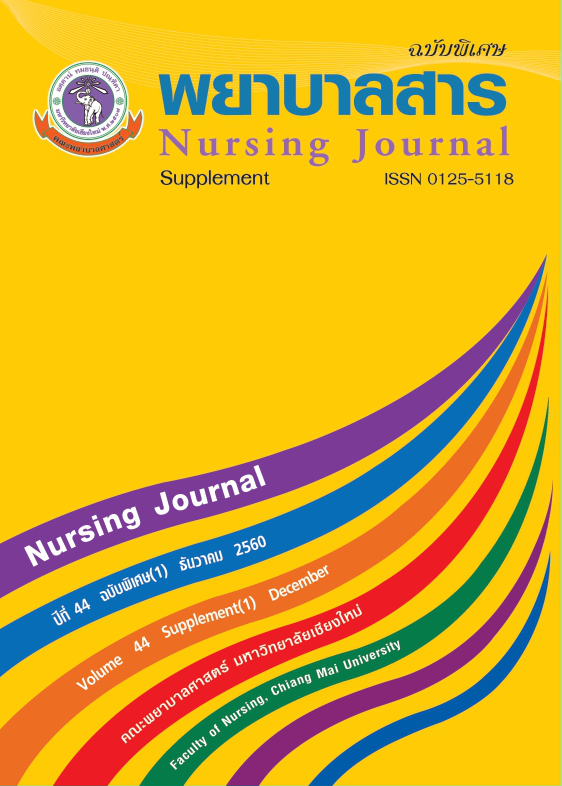Effects of Oral Stimulation on Preterm Infants’ Breastfeeding Behaviors
Keywords:
Oral Stimulation, Breastfeeding Behaviors, Preterm InfantsAbstract
Preterm infants frequently experience oral feeding problems which affect their breastfeeding performance. Oral stimulation may enhance the neuromuscular development for sucking. This quasi-experimental research (two group, pretest-posttest design) aimed to examine the effects of oral stimulation on preterm infants’ breastfeeding behaviors between an experimental and a control group. The sample consisted of 20 preterm infants with postconceptional age 30-32 weeks, who were hospitalized at the Neonatal Intensive Care Unit (NICU) and the Nursery Unit of University Hospital in Chaing Mai Province during May to October 2014. The sample was selected through a purposive sampling method which randomized matching by postconceptional age, body weight, and duration of endotracheal intubation. Each subject was randomly assigned into either the experiment group (n=10) or the control group (n=10). The experiment group received oral stimulation once a day for 10 days and the control group received routine care. The instrument used for conducting in this study was an oral stimulation program. Instruments used for data collecting consisted of the demographic data form and the Preterm Infants’ Breastfeeding Behavior Scale (PIBBS). The reliabilities were 1.0. The data were analyzed by using descriptive statistics, Fisher’s exact test, Independent t-test, and Paired t-test.
The results revealed that after intervention, the mean score of preterm infants’ breastfeeding behavior of the experimental group was statistically significantly higher than the control group (p < .01). After the intervention, the mean score of preterm infants’ breastfeeding behavior in both groups were statistically significantly higher than before the intervention (p < .01).
The findings of this study show that the implemention of oral stimulation can improve preterm infants’ breastfeeding behaviors. Therefore, nursing staff should utilize oral stimulation to promote good breastfeeding behaviors.
References
จารุวรรณ สุขนิธิ, วัลยา ธรรมพนิชวัฒน์, ไข่มุก วิเชียรเจริญ, และ วิไล เลิศธรรมเทวี. (2555). ผลของโปรแกรมการกระตุ้นการดูดกลืนต่อความรู้ในการกระตุ้นการดูดกลืนของมารดาและความสามารถในการดูดนมของทารกเกิดก่อนกำหนด. วารสารสภาการพยาบาล, 27(1), 78-91.
ชลลดา ภูมิผล. (2539). ผลการใช้โปรแกรมกระตุ้นการดูดกลืนในทารกคลอดก่อนกำหนดต่อความพร้อมและประสิทธิภาพในการดูดนม (วิทยานิพนธ์พยาบาลศาสตรมหาบัณฑิต สาขาวิชา
การพยาบาลกุมารเวชศาสตร์). บัณฑิตวิทยาลัย, มหาวิทยาลัยเชียงใหม่.
สำนักนโยบายและยุทธศาสตร์ กระทรวงสาธารณสุข. (2555). สถิติสาธารณสุข 2555. ค้นเมื่อ 13 มกราคม 2556, จาก http://bps.ops.moph.go.th/Healthinformation/statistic54/statistic54.html
สุนทร ฮ้อเผ่าพันธ์. (2550). Respiratory distress and respiratory distress syndrome. ใน วราภรณ์ แสงทวีสิน, วิบูลย์ กาญจนพัฒนกุล, และ สุนทร ฮ้อเผ่าพันธ์ (บรรณาธิการ), ปัญหาทารก
แรกเกิด (หน้า 97-111). กรุงเทพฯ: ธนาเพรส.
สุอารีย์ อ้นตระการ, และ ธิดารัตน์ วงศ์วิสุทธิ์. (2552). ความรู้สู่การปฏิบัติการเลี้ยงลูกด้วยนมแม่. ใน สุนทร ฮ้อเผ่าพันธุ์, พิมลรัตน์ ไทยธรรมยานนท์, และ เกรียงศักดิ์ จีระแพทย์ (บรรณาธิการ), Neonatology 2009 (หน้า 43-75). กรุงเทพฯ: ธนาเพลส.
หน่วยเวชศาสตร์มารดาและทารก ภาควิชาสูติศาสตร์และนรีเวชวิทยา คณะแพทยศาสตร์ มหาวิทยาลัยเชียงใหม่. (2556). Annual report: Maternal-fetal medicine 2013. ค้นเมื่อ 20 มีนาคม 2557, จาก http://www.med.cmu.ac.th/dept/obgyn/2011/index.php?option=com_content&view=article&id=167:ob-statistics&catid=31&Itemid=112
Amaizu, N., Shulman, R., Schanler, R., & Lau, C. (2008). Maturation of oral feeding skills in preterm infants. Acta Paediatrica, 97(1), 61-67. doi:10.1111/j.1651-2227.2007.00548.x
Bauer, M. A., Prade, L. S., Keske-Soares, M., Haeffner, L. S., & Weinmann, A. R. (2008). The oral motor capacity and feeding performance of preterm newborns at the time of transition to oral feeding. Brazilian Journal of Medical Biological Research, 41(10), 904-907. doi:10.1590/S0100-879X2008001000012
Beckman, D. (2011). Beckman oral motor. Retrieved from http://freepdfdb.com/pdf/beckman-oral-motor-7682559.html
Bier, J. A., Ferguson, A., Cho, C., Oh, W., & Vohr, B. R. (1993). The oral motor development of low-birth-weight infants who underwent orotracheal. American Journal of Diseases of Child, 147(8), 858-862.
Burns, N., & Grove, S. K. (2009). The practice of nursing research: Appraisal, synthesis, and generation of evidence (6th ed.). St. Louis: Saunders Elsevier.
Fucile, S., Gisel, E. G., & Lau, C. (2002). Oral stimulation accelerates the transition from tube to oral feeding in preterm infants. Journal of Pediatrics, 141(2), 230-236. doi:10.1067/mpd.2002.125731
Fucile, S., Gisel, E. G., & Lau, C. (2005). Effect of an oral stimulation program on sucking skill maturation of preterm infants. Developmental Medicine & ChildNeurology, 47(3), 158-162. doi:10.1111/j.1469-8749.2005.tb01109.x
Hwang, Y. S., Vergara, E., Lin, C. H., Coster, W. J., Bigsby, R., & Tsai, W. H. (2010). Effects of prefeeding oral stimulation on feeding performance of preterm infants. Indian Journal of Pediatrics, 77(8), 869-873. doi:10.1007/s12098-010-0001-9
Jones, E., & King, C. (2005). Feeding and nutrition in the preterm infant. Edinburgh: Elsevier Churchill Livingstone.
Lau, C. (2012). Development of oral feeding skills in the preterm infant: Handbook of growth and growth monitoring in health and disease. Retrieved from http://www.springer.com/ public+health/book/978-1-4419-1794-2.html
Lauwers, J., & Swisher, A. (2005). Counseling the nursing mother: A lactation consultant’s guide. Sudburg, Massashusette: Jones & Bartlett.
Lessen, B. S. (2011). Effect of the premature infant oral motor intervention on feeding progression and length of stay in preterm infants. Advances in Neonatal Care, 11(2), 129-139. doi:10.1097/ANC.0b013e3182115a2a
National Center for Health Statistics. (2013). Births: Preliminary data for 2013. National Vital Statistics Reports, 63(2), 1-28.
Nyqvist, K. H., & Ewald, U. (1999). Infant and maternal factors in the development of breastfeeding behavior and breastfeeding outcome in preterm infant. Acta Paediatrica, 88(11), 194-203.
Ramsay, D. T., Kent, J. C., Hartmann, R. A., & Hartmann, P. E. (2005). Anatomy of the lactating human breast redefined with ultrasound imaging. Journal of Anatomy, 206(6), 525-534. doi:10.1111/j.1469-7580.2005.00417.x
Rocha, A. D., Moreira, M. E., Pimenta, H. P., Ramos, J. R., & Lucena, S. L. (2007). A randomized study of the efficacy of sensory-motor-oral stimulation and non-nutritive sucking in very low birthweight infant. Early Human Development, 83(6), 385-388. doi:10.1016/j.earlhumdev.2006.08.003
Tenhaaf, J. J. (2008). Critical review: The effects of oral stimulation on feeding behaviours in preterm infants. Retrieved Novenber 13, 2013 from http://publish.uwo.ca/~larchiba/2008%20pdfs/Tenhaaf,JJ.pdf
Tudehope, D. I. (2009). Evidence base for feeding guidelines for preterm infant. Neonatal Nurses College Aotearoa Conference 2009, Christchurch, New Zealand. Retrieved Novenber 13, 2013 from http://www.nzno.org.nz/LinkClick.aspx?fileticket=gdLXm3Tp7Dc%3D&tabid=605.html
Downloads
Published
How to Cite
Issue
Section
License
บทความที่ได้รับการตีพิมพ์เป็นลิขสิทธิ์ของวารสารพยาบาลสาร
ข้อความที่ปรากฏในบทความแต่ละเรื่องในวารสารวิชาการเล่มนี้เป็นความคิดเห็นส่วนตัวของผู้เขียนแต่ละท่านไม่เกี่ยวข้องกับมหาวิทยาลัยเชียงใหม่ และคณาจารย์ท่านอื่นๆในมหาวิทยาลัยฯ แต่อย่างใด ความรับผิดชอบองค์ประกอบทั้งหมดของบทความแต่ละเรื่องเป็นของผู้เขียนแต่ละท่าน หากมีความผิดพลาดใด ๆ ผู้เขียนแต่ละท่านจะรับผิดชอบบทความของตนเองแต่ผู้เดียว






